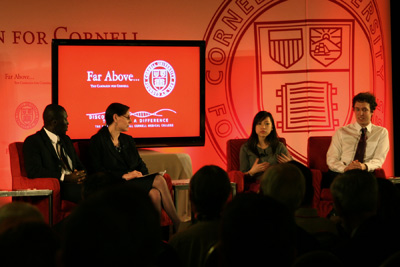Student panelists share big visions, simple pleasures
By Jennifer Campbell

Right outside, jetliners were landing and taking off a few feet above the waters of San Francisco Bay. But on March 18, inside the San Francisco Airport Marriott, it was Cayuga's waters that most came to mind. About 250 West Coast Cornellians gathered for Big Red by the Bay to celebrate Cornell connections, hear from talented professors and students and learn about Cornell's strategic direction.
Two panel discussions highlighted the event. The first, "A Student Conversation: Living and Learning at Cornell Today," offered alumni a glimpse into today's student experience with human ecology professor Valerie Reyna and panelists David Korda, Ph.D. '11, Serena Chiang '10 and Dorian Bandy '10.
An aerospace engineering student from Ghana, Korda described his research on the dispersal of dust and other particles through atmospheres. Though his work focuses on Martian conditions, Korda emphasized that the research also has implications for the migration of radioactive particles and bioterrorism threats. His next steps, he said, will take him into the aerospace industry in the United States or Europe, but he hopes to return to Ghana to teach.
Chiang also described research with a global view. She is about to embark on a year of research training at the National Institutes of Health, where she will investigate the causes of malaria. A pre-med student, she is completing an honors thesis on the causes of preeclampsia, a pregnancy-related disorder, in professor Robin Davisson's lab. "Professor Davisson urged me to consider doing an M.D./Ph.D.," said Chiang. "She showed me the connection between research and medicine; she really changed my entire career path." According to Reyna, such close relationships with undergraduate students are a recent but welcome development in the sciences.
Bandy noted that the prospect of working closely with scholars is also part of why he chose a liberal arts education at Cornell over training at a music conservatory. A musician, Bandy is guided by a belief that "academics and performance cannot be separated," especially in the pursuit of relatively obscure musical periods. "The music department has given me so many excellent role models. They have become part of who I am," he said. Bandy dedicates much of his free time to "bringing baroque instruments and styles to modern ears," organizing concerts on campus and leading Les Petits Violons, a performing group he founded.
"I expected a rigorous program. What I did not expect was such an effort to extend the academic and intellectual environment into home life," said Korda, a graduate fellow at Becker House. "We act as intellectual role models for undergraduates, and we also give them a glimpse at graduate life."
With such goal-driven lives, down time was a hot discussion topic. Korda and Chiang cited a love of knitting, to the audience's amusement. But it was another pastime that drew the biggest reaction. "We always make a fun trip of going to Wegmans," Chiang said.
Peter Meinig '61, chairman of the Cornell Board of Trustees, delivered closing remarks about university strategy and performance.
Big Red by the Bay was the third in a series of events aimed at generating interest in supporting "Far Above … The Campaign for Cornell." The two previous events were held in New York City and Washington, D.C. The next event will be held in Boston in November.
Jennifer Campbell is a writer for Alumni Affairs and Development.
Media Contact
Get Cornell news delivered right to your inbox.
Subscribe